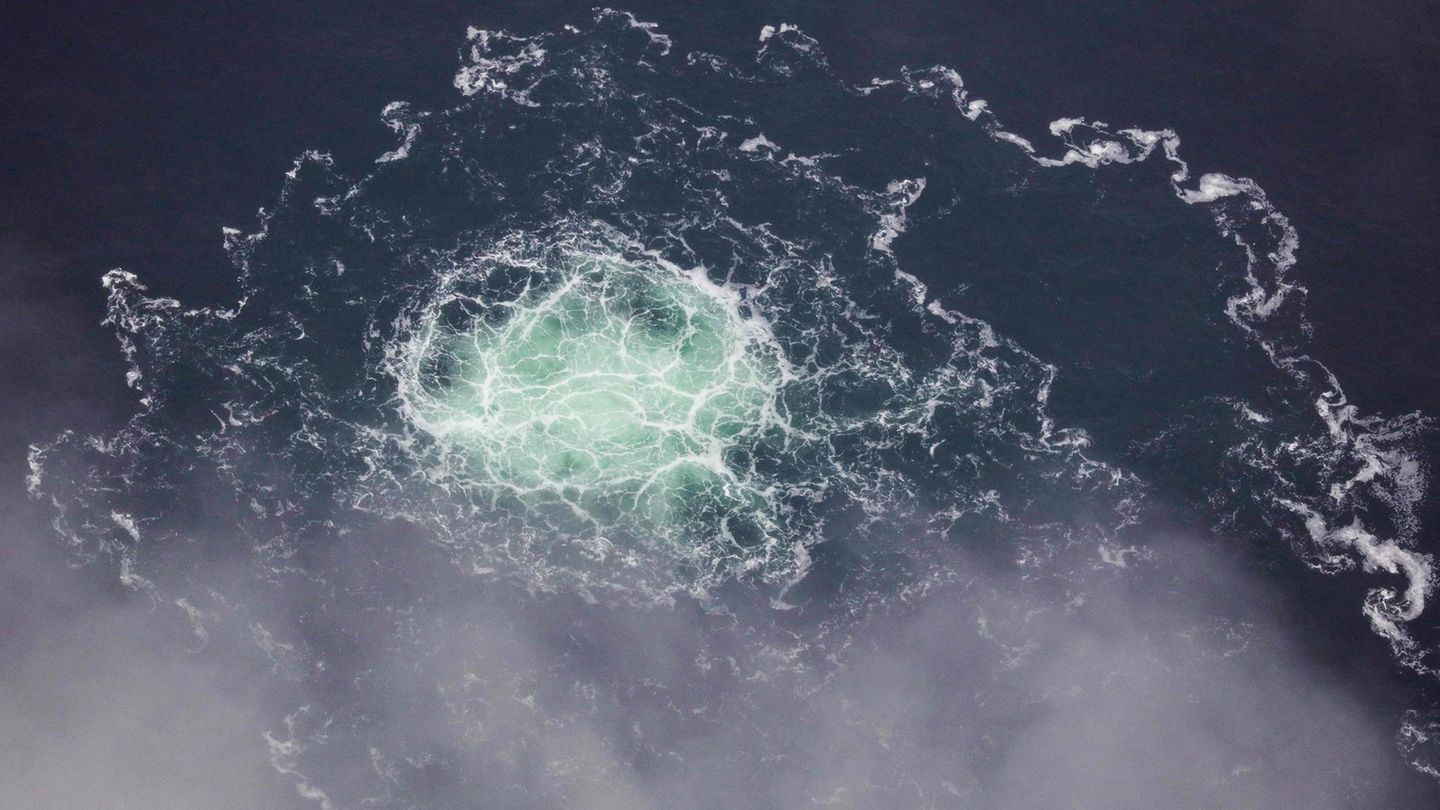Gas is still leaking from four leaks in the Nord Stream 1 and 2 pipelines. Sabotage is now the most likely cause. Russia in particular is suspected of being a suspected saboteur. But with what arguments?
The leaks in the Nord Stream 1 and 2 Baltic Sea pipelines continue to puzzle the investigating experts. In the morning it became known that there is a fourth point where gas is leaking from the two lines. Three of the four leaks are apparently within a few kilometers of each other. The two exit points in Sweden’s exclusive economic zone are only one nautical mile apart, which corresponds to almost 1.8 kilometers, according to the Swedish Coast Guard. The smaller of these and one of the two in the Danish zone would be 2.6 nautical miles (about 4.6 kilometers) apart.
There also seems to be agreement on what led to the four gas leaks. Namely a targeted sabotage action. NATO once again agreed with this view in the morning. “All information currently available indicates that this is the result of intentional, reckless and irresponsible acts of sabotage,” said a statement from the North Atlantic Council of 30 member states. Lithuania’s foreign minister even described the action as a “terrorist act”.
But that is currently what the reliable facts are. A detailed examination of the four gas exit points has been announced, but can only take place once all the gas has escaped from the tubes. From Denmark it was said that more than half of the gas in the pipelines had already leaked. “We expect the rest to escape by Sunday,” Danish Energy Agency head Kristoffer Bottzauw said at a news conference.
Who is a possible saboteur of the Nord Stream pipelines?
Nevertheless, there is a lot of speculation going around as to who could be the possible saboteur. Russia in particular is brought into play by many experts. According to a CNN report, which cites several European intelligence sources, ships and submarines belonging to the Russian Navy were near the spots where the leaks later occurred earlier in the week. However, this is not really a reliable indication, since the Russian Navy is regularly in these waters. “We see them every week,” said a Danish army representative laconically.
But what justifications are given for Russia being the perpetrator? Here is a short list:
- In the ARD morning program, the CDU foreign policy expert Roderich Kiesewetter expressed the suspicion that Russia was the cause of the incidents because the country had an interest in spreading uncertainty among the population. “I think it’s obvious that it could have been Russia,” explained Kiesewetter. The incident fits with Russia’s announcements that it no longer wants to route gas through Ukraine. In addition, Russia has an interest in rising energy prices and owns the lines. It could also be a sign to your own population along the lines of: “Look, we’re being attacked, our infrastructure is being destroyed,” said the CDU politician.
- The security expert Johannes Peters from the Institute for Security Policy at the University of Kiel also had his say in the ARD morning show. One possible reason for Russian sabotage is to send a “strong signal” to Europe, especially Germany and Poland, that the same could be done with pipelines that are much more important for our security of supply, such as the pipelines from Norway: “So don’t be so sure that you’re well set up for the winter and that you’re going to be able to compensate for our gas.”
Increase pressure on Germany
- Another possible reason for a possible Russian act of sabotage is that in winter “the Nord Stream 2 pipe, which is still intact, can be used to increase pressure on Germany, for example if domestic political pressure on the government should increase because gas prices are high because we might not have enough gas for the winter after all.” Then Russia could offer to deliver gas through the intact pipeline after all. To do this, however, Germany would have to “pull out of the Western sanctions regime.”
- In an interview with NDR-Info, the head of the Bundeswehr regional command in Hamburg, Captain Michael Giss, pointed out that “the sequence of the partial mobilization of Russia, the referendums and now the story with the pipeline is a very remarkable sequence of events”. The Russian Navy has drones or small submarines that could be used for such purposes. In addition, certain measures may have been taken in advance of the construction of the pipeline to trigger such an event. A major action by the Russian Navy is not necessary, Giss explained, “These are small instruments that can also be easily hidden under a civilian coat.” In his eyes, the message conveyed was short and to the point: “Look at what we can do, how far our abilities go – and don’t be too sure of anything!”
So sabotage as a demonstration of power? At least that is the opinion of Mauro Gilli, an expert at the Center for Security Studies at the ETH in Zurich. “Russia would show that it can also attack other pipelines or submarine cables,” Gilli was quoted as saying in the Austrian newspaper Die Presse.
Difficult to protect critical underwater infrastructure
Submarine cables in particular are a particularly vulnerable detail in global communication. It is estimated that 95 percent of Internet traffic is processed via this line of communication every year, and a ship’s anchor that has been laid incorrectly sometimes causes important data lines to be severed. A complete monitoring of the critical infrastructure under water, as it is now being demanded, is almost impossible. “The world’s oceans are too big. You can’t monitor the entire length of submarine cables 24 hours a day. There are simply too many points at which submarines can attack,” said expert Gilli in the “Presse”.
“It’s all part of Russian political warfare. It’s about sowing doubt, creating just enough fog of uncertainty,” says Bryan Clark, a former US Navy strategic planner who is now a senior fellow at the think tank Hudson Institute in Washington, in the Times.
However, as conclusive as the arguments in favor of Russia as the suspected cause of the four gas leaks may appear, there is still no compelling evidence for this. At least not until the first test results are available. In the meantime, what the former chairman of the Munich Security Conference, Wolfgang Ischinger, laconically stated on Twitter: “The only currently compelling conclusion is this: there is war in Europe.”
Source: Stern
David William is a talented author who has made a name for himself in the world of writing. He is a professional author who writes on a wide range of topics, from general interest to opinion news. David is currently working as a writer at 24 hours worlds where he brings his unique perspective and in-depth research to his articles, making them both informative and engaging.




